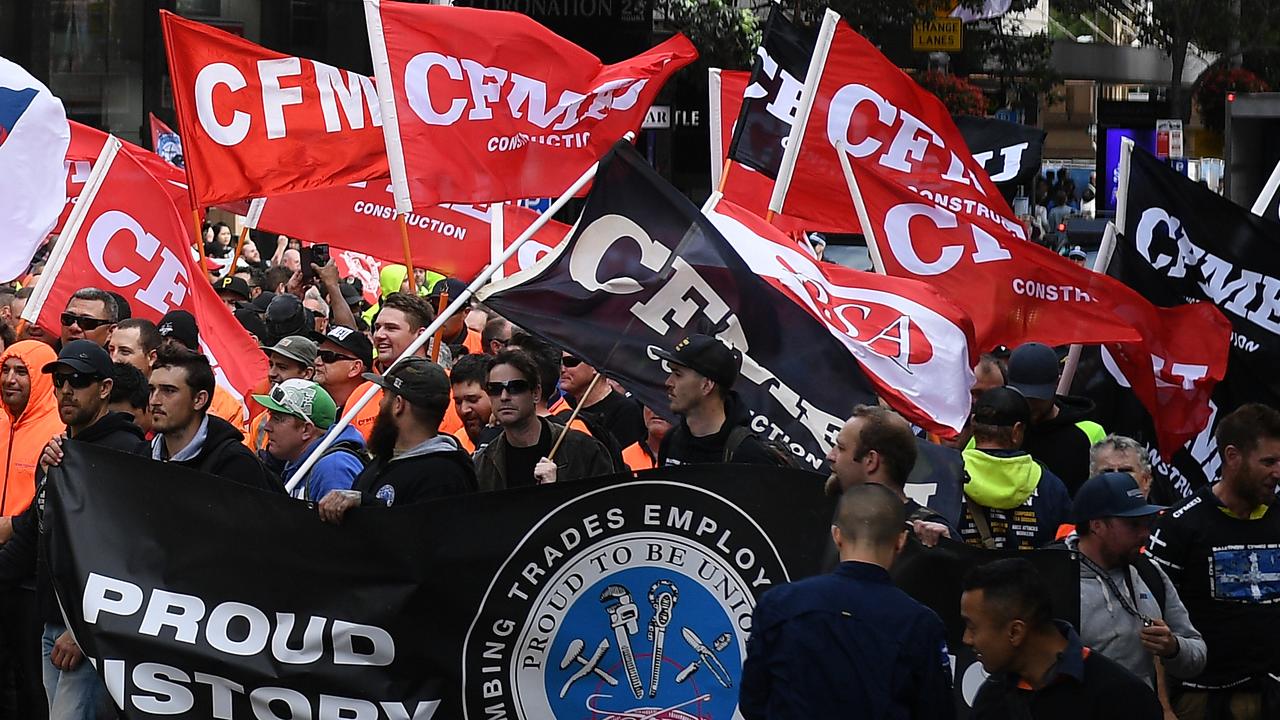Labor conference: ALP backs unions in overhaul to wages bargaining
Federal Labor has cleared the way for unions to pursue multi-employer bargaining beyond low-paid industries if Bill Shorten wins.

Federal Labor has cleared the way for unions to pursue multi-employer bargaining beyond low-paid industries if Bill Shorten wins power, backing the right of unionists to make wage claims on multiple employers where enterprise bargaining has failed.
Declaring that enterprise bargaining was not even working for “well-paid” workers, the Opposition Leader yesterday told the ALP national conference that Australia needed a new wages system that would address the stagnating pay of workers.
Employers expressed “alarm” at the push, saying Labor had refused to rule out industry bargaining across all sectors or strike action in support of industry claims. “Labor needs to urgently clarify if the proposals are just for the low-paid stream or the economy as a whole, because, as things stand, they have left the door open to rampant industrial disputation across the entire Australian economy,” Australian Industry Group chief executive Innes Willox said.
The Transport Workers Union had been pushing Labor in the lead-up to the conference to extend industry-wide bargaining beyond low-paid industries to airlines, setting up a potential showdown with Qantas chief executive Alan Joyce.
After days of behind-the-scenes negotiations within the ACTU leadership at the party conference in Adelaide, Labor workplace relations spokesman Brendan O’Connor told delegates an ALP government would allow unions to pursue pay claims against multiple employers where enterprise bargaining had not worked. “Where enterprise bargaining has failed or is failing, multi-employer bargaining should be another available option,’’ he told delegates.
Labor and unions will continue to negotiate in the lead-up to next year’s election over the multi-employer bargaining framework.
The party says it has not yet decided whether it will give unions the legal right to strike in support of multi-employer claims.
In an address on the final day of conference, Mr Shorten said stagnating wages represented one of the biggest economic challenges facing Australia, and the nation needed a “new system set up for the 2020s”.
“Enterprise bargaining, in its current form, is simply not doing the job for wages in this country,’’ Mr Shorten told delegates.
“It doesn’t work for funded services. It doesn’t work for people who have little or no bargaining power. It doesn’t work for people at the end or the bottom of the supply chain.
“It doesn’t work for labour-hire or casual workers. And increasingly it doesn’t work for well-paid workers and their employers under collective agreements which have been negotiated in good faith over the last two decades, with give and take and greater productivity.
“Because even those who participate in enterprise bargaining are now at risk of being left stranded because the system now rewards wage-cutting.”
Declaring Labor to be the best party to make sure that “wage rises start happening again”, Mr Shorten said Labor would work with employers but the new wages policy would not be a re-run of the Hawke-Keating Accord, as the world and the labour market now were vastly different from 1983.
Mr Shorten reaffirmed that Labor would introduce a raft of workplace proposals to benefit unions and workers, including the reversal of penalty rate cuts, changes to gender pay provisions of the Fair Work Act, a new definition of casual employment and a commitment that labour-hire workers would be paid the same as another worker doing the same job in the same workplace.
Delegates passed a resolution committing federal Labor to working with Safe Work Australia and state and territory governments to introduce a nationally consistent industrial manslaughter offence.
Federal Labor will use Queensland laws as a starting point, and pursue adoption of this amendment in other jurisdictions through the formal harmonisation of the work health and safety laws process.
In Queensland, if a person conducting a business or undertaking, or a senior officer, commits industrial manslaughter, a maximum penalty of 20 years’ jail for an individual or $10 million for a body corporate applies.
Addressing the conference, Australian Council of Trade Unions secretary Sally McManus said the trade union movement was “the early warning system for this nation”.
“We are sounding the alarm now,’’ she said. “We see the unfairness, we see the fair go being crushed with growing inequality. It is time to listen and to act. And Australian Labor, Bill Shorten, is doing just that.”
Mr Willox said all Australian businesses would be at risk of disproportionate union claims should the bargaining policies announced at the conference be implemented. “They would threaten the existence of businesses and the livelihoods of their employees,’’ he said.
Australian Chamber of Commerce and Industry chief executive James Pearson said Australia should be trying to fix problems in the enterprise bargaining system, “not go back to industry bargaining, which big unions will flock to because it will be easier and cheaper for them”.
“There should not be a perverse incentive for big unions to prolong bargaining needlessly and manipulate the bargaining process, seeking the reward of arbitration,’’ Mr Pearson said.
“If Labor is to consider industry bargaining, it needs to explain how it will prevent bad bargaining behaviours.”
Jobs and Industrial Relations Minister Kelly O’Dwyer said: “Christmas has come early today for John Setka and his union boss mates.
“Today, Bill Shorten and his team gave the green light to industry-wide strikes which would see a return of the industrial disputation of the 1970s, where strike rates were 40 times higher.
“It will cripple small businesses, it will see essential services shut down, whether they be childcare, our schools and our hospitals.”





To join the conversation, please log in. Don't have an account? Register
Join the conversation, you are commenting as Logout